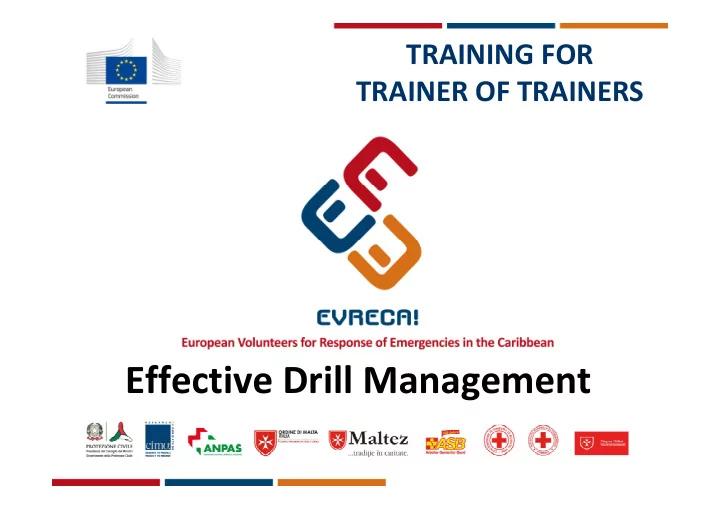

TRAINING FOR TRAINER OF TRAINERS Effective Drill Management
Lesson overview • Part one: general overview – Different types of drills – Goal of a drill – Objetctives of a drill – Drill project cycle • Part two: scenarios & drill planning • Teamwork: drill organisation • Final discussion and feedback
Drill Typologies • During a training (learning assessment) – Practical exercise – Paper exercise – Evaluation • Technical retrain (rescue, fire, …) • Real size (with/without population) • Tabletop/Roleplay • Alert & Communication (network & contacts test) • Demonstration/Flag 3
Goal of a Drill • Individual evaluation • Self assessment • Test of scenarios, plans, procedures • Equipment evaluation and test • Resources mobilization & contact lists • Teamwork and relationships evaluation • Show the capability • Dissemination/recruitment
What to test Non-person related Person related • Plans, command chain • Training self assessment • ICT Systems • Participant evaluation • Contact lists • Experience new situations • Interagency relationships • Team dynamics • Technical skills • Team building • Facilities, equipment, • Community behavior supplies • Stress test 5
Drill project cycle Monitoring Needs/Goal Evaluation assessment Event Planning Preparedness
7 steps 1. Goal, objectives & target (participants) 2. Organizational Comitee & Observers (Teachers) 3. Meetings (goals, needs, resources, harmonization) 4. Venues & logistics (location, authorisations, meals, ...) 5. Budget 6. When (date(s), screenplay, gantt) 7. Evaluation system
Needs/Goals assessment Why? What? Who? When? Where?
Objectives SMART approach: – S pecific – M easurable – A chievable – R ealistic – T imed • Not to many! • Related to the goals • To be documented (observers) • Positive oriented
Organize a drill • Meetings schedule – Planning, Final meeting – Debriefing • Required ressources – Equipment, Personnel – Logistics, Budget (?) • Plan/Scenario/Timetable • Goals and evaluation – Observers (monitoring) – Participants feedback • Safety! 10
Time management (before/during the drill)
Scenario definition • Select and define a scenario • Define screenplay/timetable • Rules of the «game» Depends from: • the type (blind/flag) • the goals of drill • Structure(s) involved • Available time
Comfort Zone Overstress Zone Comfort Zone Boring Boring Area Zone 13
Real life vs. simulated world Real life Time Simulated world Drill 14
simulators & realistic exercise • Make up • Sounds, scream, realistic behaviour • Blind exercise • Injects � Importance of the rule of the “game” � Importance of “border of the drill”
Preparation • Last minute briefing • Simulation site preparation – Building – Outdoor area – Facilities – Other logistic support (meal) • Public information • Team preparation • Final check (weather forecast)
Safety • Participants briefing & debriefing • reserved team for real emergencies (identifying) • code “XXXX” for drill stop and/or radio silence • informations panels “exercise in progress” • public authorities information • register participants (check-in & check- out) • verify other conditions (ev.delay/suppress) 17
Observers • Role play masters • Drill evaluators • Visitors • Authorities • Press • Simulators • Bystanders 18
Drill “biases” Maneageable Unmaneageable Individual behaviour Light injury Screenplay delay/deviation death rain 19
Documentation • Pictures • Videos • Logbook • Evaluation forms • Debriefing and Reporting • Press conference/interview • Press rewiew 20
Recommend
More recommend